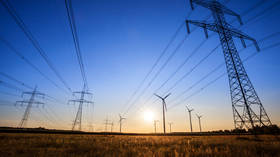Germans warned of power cuts

Germany could face an electricity shortage in the next two years as its own energy resources become increasingly insufficient and demand rises, Welt am Sonntag reported on Sunday, citing a local McKinsey study.
According to the findings, by 2025 the country will lack some four gigawatts of power capacity, while by 2030 the deficit will increase to 30 gigawatts, the company said.
“So we’re heading toward a significant shortage: 30GW corresponds to the capacity of about 30 large thermal power plants,” the study warned. Analysts claim the country will not be able to cover its energy needs with its own resources at peak loads, and by 2030 up to 100 power outages may occur, with the longest phase lasting about 21 hours. The analysts also warned that Berlin will not be able to give up gas in the next ten years.
“Our scenario analysis shows that natural gas will have to play a role in the electricity mix in the future. It is therefore important to reduce import dependency by diversifying suppliers. Part of the strategy must also be to make more green hydrogen available for power generation,” analysts stated, adding that Germany must also ensure it can obtain electricity from neighboring European countries, which requires innovation and expansion of networks.
The McKinsey study contradicts a recent report by the country’s Federal Network Agency, which said the power supply would be secure for the next decade even if electricity consumption increases significantly.
However, even the agency said various steps were necessary to ensure sufficient supply, including expanding the capacity of renewable power sources and setting up back-up power plants, largely powered by natural gas.
Earlier, Bloomberg reported that by 2030 Germany will have to spend at least $1 trillion to increase energy production from renewable sources. The German grid regulator and think tank Agora Energiewende estimates that Germany will face a one-third increase in demand by 2030, which means the country’s power plants will need to generate about 250 gigawatts of additional electricity by that time.
For more stories on economy & finance visit RT's business section













